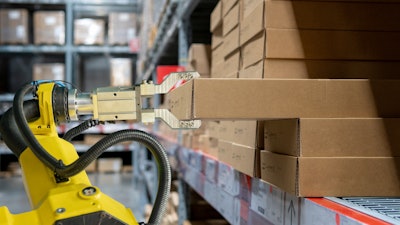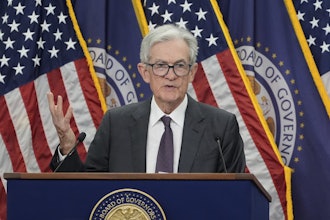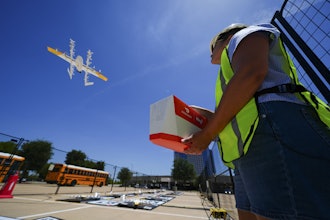
Dr. Yossi Sheffi is an award-winning global supply chain expert and MIT Center for Transportation and Logistics director. He recently published his new book, "The Magic Conveyor Belt: Supply Chains, A.I., and The Future of Work."
I recently had the opportunity to interview Dr. Sheffi to discuss why distribution networks need to be redesigned, the impending robot apocalypse in warehousing and transportation jobs and how to create the talent pool to serve supply chains of the future.
David Mantey: Many companies balk when it comes to sustainability efforts because the final decision always comes down to cost. Realistically, how far are we from a supply chain that can support sustainable sustainability?
 Dr. Yossi Sheffi is an award-winning global supply chain expert and MIT Center for Transportation and Logistics director.
Dr. Yossi Sheffi is an award-winning global supply chain expert and MIT Center for Transportation and Logistics director.
So, while supply chain operations are the place to focus efforts, many consumers are not willing to pay more for sustainable products, packaging, recycling and other processes that advance the sustainability agenda, limiting what companies can invest in and achieve. I do not think the issue is lack of raw materials. It is mainly the reluctance of consumers, despite what they tell pollsters, to actually pay even a little more to fight global warming.
Mantey: To make supply chains more sustainable, entire distribution networks need to be redesigned. Will such redesigns be performed by a human, or is this a task better suited for A.I.?
Dr. Sheffi: Complete network design can only be performed by humans. The reason is that such new designs invariably involve new commercial relationships which require human contact. For the foreseeable future, getting a new supplier on board, or landing a new large customer, will involve tough negotiations followed by a dinner and discussions about family matters.
Good supplier/customer relationships involve trust, which is difficult to develop with digital-only touch points. And such trust comes into play when disruptions, new regulations, new technologies or other changes stress the relationship.
Mantey: In logistics, is there an impending robot apocalypse that will see the permanent replacement of warehousing and transportation jobs?
Dr. Sheffi: I don't see this. While clearly, some jobs may disappear, and others will change. However, keeping with historical trends, technological innovation will redefine roles and create new employment opportunities that harness uniquely human capabilities.
Many of the new jobs will involve supervising the machinery, maintaining it and analyzing its output. Some of these roles will require enhanced technical skills. However, AI advances are making human-machine interactions simpler and easier.
In addition, many existing jobs will remain and even increase in number as the new technologies create efficiencies which increase demand. For example, when ATMs became widespread people thought that tellers would disappear. However, there are more than twice as many tellers today in the U.S. compared to the time when ATMs just came onto the scene. The reason is that with ATMs it became cheaper to operate more bank branches and be closer to the customers, so more branches opened and more jobs were created. Then there are human qualities that will still be required even in a highly automated retail environment, like context for decisions, a critically important backup when technology fails or is corrupted, and relationship-building relations.
Mantey: As human roles are replaced with automation, the idea is that humans will have the opportunity to concentrate on the more fulfilling parts of their jobs. Do you believe that?
Dr. Sheffi: Not sure about that. Clearly some drudgery may be taken out of many jobs, but watching a computer screen and operating an iPad to move robots around the plant or the warehouse can also become boring after a while. Sitting in an autonomous truck or a platoon and just watching the AI drive can become boring too, whether it is done from the cam or from a remote-control office. On the other hand, there are likely to be many new and yet-unknown jobs that, as they develop, will leave a lot of room for creativity which is the fulfilling part of most jobs.
Mantey: What do we need to do now to create the talent pool to serve supply chains of the future?
Dr. Sheffi: Opportunism to learn was never more abundant. The proliferation of online sources of knowledge and courses covers every corner of required talent development. New AI-infused learning modules that can detect the ability of the user and adjust the content make the learning even more effective.
At the same time, I think the U.S. will develop a German-like system of cooperation between government companies and local colleges and trade schools to ensure people's ability to train in state-of-the-art environments.
 "The Magic Conveyor Belt: Supply Chains, A.I., and The Future of Work," by Dr. Yossi Sheffi.
"The Magic Conveyor Belt: Supply Chains, A.I., and The Future of Work," by Dr. Yossi Sheffi.
Dr. Sheffi: The answer to this question is, unfortunately, political. I do see a bright future but we have to anticipate the mistakes and not repeat them. For example, the developers of the Internet thought that it would bring better communications and more harmony to the world – and it did. However, the Internet was not built to be immune to, for example, cyber-attacks, identity thefts, and loss of privacy.
Globalization did lift millions of people around the world out of poverty and created the middle class around the world. Yet, some workers were left behind, creating many of the political divisions and problems we witness today. So, with the new tech, countries need to make sure that as much as possible, everybody will benefit. I wish I had a clear prescription for this.























